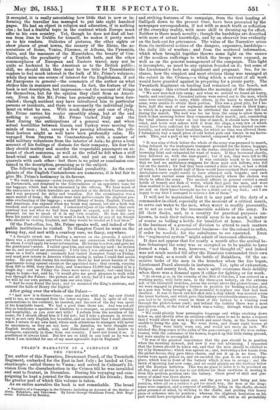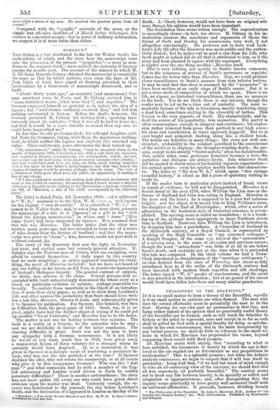PEARD'S NARRATIVE OF A CAMPAIGN IN THE CRIMEA.'
THE author of this Narrative, Lieutenant Peard, of the Twentieth Regiment, embarked for the East in last duly; he landed at Con- stantinople; sailed thence to Varna ; and served in Cathcart's Di- vision from the disembarkation in the Crimea till he was invalided and sent to Scutari, in December. During his voyaging and cam- paigning he kept a journal for the amusement of his friends; from the greater part of which this volume is taken.
As an entire narrative the book is not remarkable. The broad
• Narrative of a Campaign in the Crimea; including an Account of the Battles of Alma, Balaklava, and Inkerman. By Lieut. George Shuldham Peard, 20th Regi- ment. Published by Bentley.
and striking features of the campaign, from the first landing at Gallipoli down to the present time, have been presented by the newspaper correspondents, if not with so much truth or reflection of the everyday reality, with more skill in dressing-up for effect. Neither is there much novelty ; though the hardships are described with more of actual knowledge, and by an observer less evidently on the look-out for grievances. The value of the Narrative arises from its incidental notices of the dangers, exposures, hardships— the daily life of warfare ; and from the scattered information, which when brought together throws some light on the causes of the needless. sufferings to which the troops were exposed, as well as on the general management of the campaign. This light is incomplete, as must be any opinion founded on it ; but some of the Lieutenant's facts are significant and pregnant. See, for in- stance, how the simplest and most obvious thing was managed at the outset in the Crimea,—a thing which a servant of all work would have guarded against in preparing for a picnic party. The Twentieth Regiment on landing had remained on the beach, not in the camp : this extract describes the morning of the advance.
" We now marched into camp; and when we arrived we found all hurry, bustle, and confusion. Uncooked rations were served out to the men, which some were unwilling to carry, while others, in the hurry to stand to their arms, were unable to obtain their portion. This was a great pity, for I be- lieve half the men of our regiment started without water in their kegs ; to which in a great measure must be attributed the number who fell out during the march. The well was too far from the camp to allow them to fetch it that morning before they commenced their march ; and, considering the total absence of water on our line of march, it should have beenpro- vided, and boats sent ashore with it from the ships, a very few of which would have been sufficient for their wants. Our men thus started uncom- fortably, and without their breakfasts, for which no time was allowed them. I fortunately had a small piece of cold boiled pork and biscuit in my havre- sack. This, and a pullet my water-barrel,Ccomposed*my dejetirr.
" It was nine o'clock before the whole of the army was prepared to march, being delayed by the inadequate transport provided for the stores, baggage, &c. Many of our men fell down in the ranks, attacked by cholera, or from becoming faint and exhausted for want of water. If they recovered shortly, they followed us, with the rear-guard ; but if not, they were left to the tender mercies of any passer-by. It was certainly much to be lamented that we had no ambulance-waggons for these poor sick fellows, who fell
out on the march ; for had they been carried a mile or two or had a drink
of water, I have no doubt half of them would have rejoined companies. Ambulance-carts ought surely to have attended each brigade ; and each should have carried some medicine, particularly where the cholera was likely to affect the army. The medical officers in general carried a small bottle of brandy and flask of water, which they gave the men, and were thus enabled to do much good. Some of our poor fellows actually came to me and on their knees besought me for a drink out of my flask ; and I am happy to say that I managed to relieve a few of them."
It will not be maintained that it is any part of the duty of a commander-in-chief, especially at the moment of a critical march, to serve out water to the men, when water is readily procurable, or to act as cook to the innumerable soldiers of the army. To fill their flasks, and, in a country for practical purposes un- known, to cook their rations, would seem to be as much a matter of course as boiling a kettle for breakfast at home. Neither is it the business of a general of division to attend to such matters at such a time. It is regimental business—for the colonel to order, if order be needed; for the subalterns to see executed. Even the "regimental system" might admit of increased efficiency.
It does not appear that for nearly a month after the arrival be- fore Sebastopol the army was so occupied as to be unable to have formed a road. It was, however, "not thought of," and indeed was not much needed till after the Russians commanded their own regular road, as a result of the battle of Balaklava. Of the ex- cessive tasks of the men in the trenches when the fire began, Lieutenant Peard abounds in instances. Yet, spite of exhaustion, fatigue, and scanty food, the men's spirit overcame their debility when there was a demand upon it either for fighting or for work.
"At eleven p.m. in the evening of the 30th of October, I was ordered on a working party, with forty men, to the three-gun battery, on the extreme left of the Greenhill trenches, across the ravine above the picket-house ; and we were engaged in placing a furnace in position for heating red-hot shot, as a gun was being brought up (24-pounder) to replace one that had been disabled. It was to throw red-hot shot into a ship which was moored across the inner harbour, and which gave this battery considerable annoyance. The gun had to be brought round in front of the battery by a winding road through the picket-house yard ; and behind the battery there was a moat precipitous rock, at the foot of which was a valley, through which the gun had to pass.
" We could plainly hear persuasive language and whips cracking down below us, and shortly after an artillery-officer came to me to make a request that I would allow my men to go down and assist them, as the horses were unable to bring the gun up. We went down, and found eight horses at work. They were fairly worn out, and would not move an inch. We hitched the drag-ropes to the axles of the gun-carriage; and the men endea- voured, with the assistance of the horses, to get it up this little rising ground, but were unable to accomplish it.
"It was of the greatest importance that the gun should be in position when the morning dawned, and now it was fast advancing, 1 requested that the horses should he taken out, and that the men should be allowed to try it by themselves; which was agreed on ; and, borrowings few hands from the picket-house, they gave three cheers, and ran it up in no time. The horses were again placed in, and we escorted the gun to its next sticking- place, which was in front of the battery which it was to occupy ; and the dawn of morning had now come, and we could plainly see the harbour below and the Russian batteries. This was no place to leave it to be practised on all day, and all praise is due to our fellows for their exertions in moving it from this perilous position into the battery. Great proof of skill and pre- sence of mind was there shown.
"The horses had been taken out, and the gun was just being put into position, when all on a sudden it got too much way, the men at the drag- ropes were capsized, and a corporal of artillery, being in the shafts, showed great presence of mind, by sticking to the shafts, and guiding this heavy piece of ordnance into its position ; whereas the slightest hesitation on his part would have precipitated the gun over the cliff, and in all probability
have killed a dozen of my men. lie received the greatest praise from all around."
Compared with the "graphic" accounts of the press, or the simple but effective sketches of A Month before Sebastopol, this volume is somewhat meagre; but in point of military information, we suspect it is of more value than either.



































 Previous page
Previous page